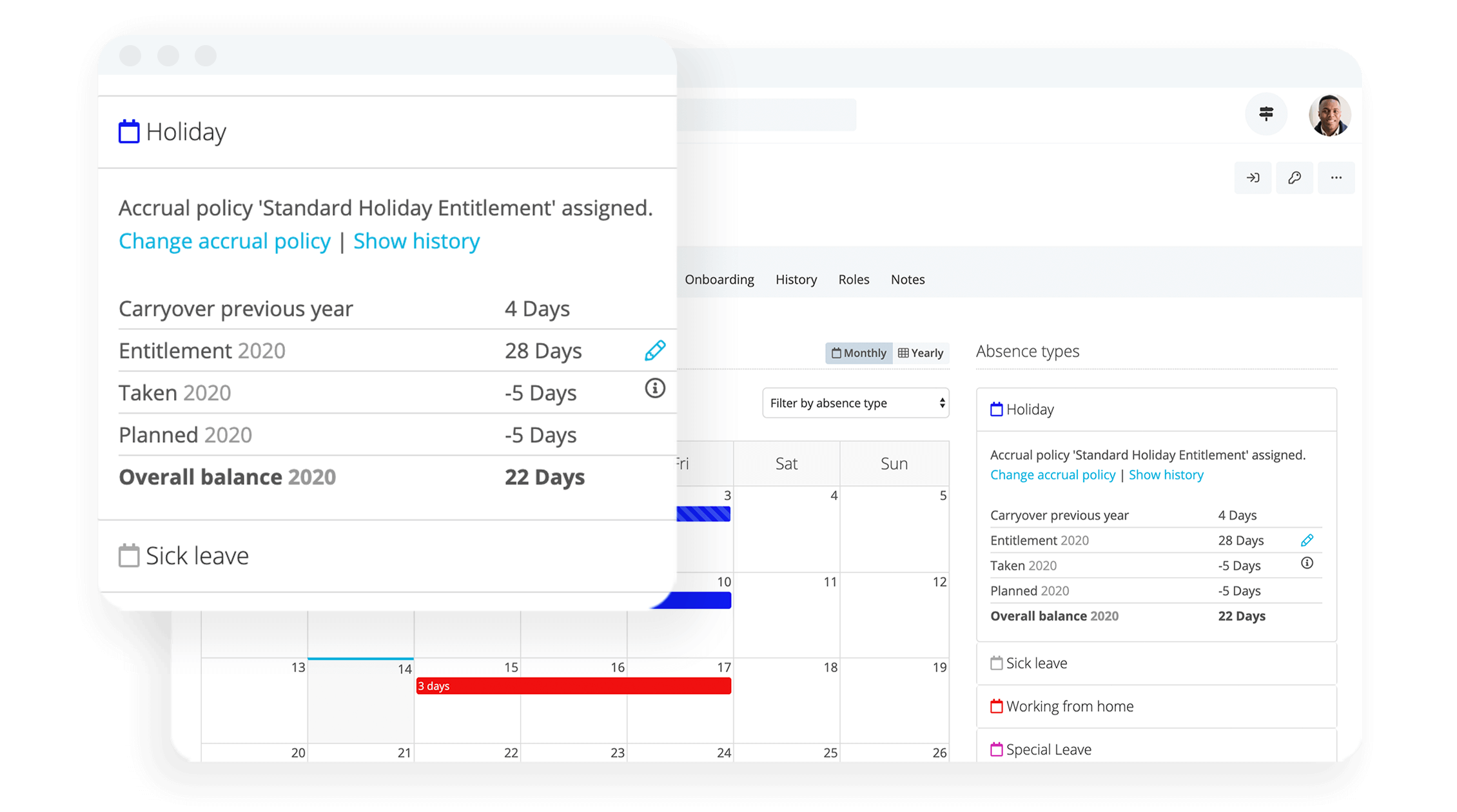Our Guide To Unpaid Leave In The UK

How do you best understand and handle unpaid leave? Whether it's an unexpected family emergency, a house move gone wrong, or just a long-overdue holiday, it’s important to understand and track the amount of leave your employees are taking in the UK.
In this article, we offer our own comprehensive overview of unpaid leave, its specific nuances in the UK, and some of the best ways to consider it, analyse it, and completely understand it within your organization. We hope you enjoy the read.
Track and report on absences across your organisation with Personio.What Is Unpaid Leave?
Unpaid leave is a way in which employers can offer dedicated staff members time off work when paid leave is exhausted. It is an opportunity for employees to take time off in unexpected circumstances, as well as an opportunity for employers to showcase goodwill toward employees in potential times of crisis.
How Much Unpaid Leave Can UK Employees Take?
With three exceptions – having to attend jury service, looking after children, and furlough – there are no fixed rules about how much unpaid leave employees can take. As with many legally unclear HR issues, it’s better to err on the side of caution and describe your rules and requirements relating to unpaid leave in employee contracts or an employee handbook.
Can an Employer Force Employees to Take Unpaid Leave?
In short, yes. ACAS says, "Your employer can make you take: your holiday days when they want, for example, they might shut down over Christmas unpaid leave at times, if it’s in your contract."
How Is Unpaid Leave Deducted From Employee Salaries?
According to NIDirect, employees, workers, and some other groups are protected from employers making unauthorized deductions from their pay and wages. The key word here, however, is “unauthorized”. Employee contracts should cover when unpaid leave is allowed, and when it will be deducted.
What Does British Law Say About Unpaid Leave?
The rules about unpaid leave in the UK, especially with regards to small-to-medium enterprises (SMEs), are limited. That said, the government does have rules about two types of unpaid leave:
When you have to serve on jury or magistrate duty and
When you need to look after children.
Other types of unpaid leave are not mandatory but are important for HR leaders and business managers to consider when understanding and tracking unpaid leave.
Gain an Instant Overview of Unpaid Leave

Every type of employee absence, including unpaid leave, from a single source of truth.
All Your Absences In One PlaceWhy Is it Important to Allow Unpaid Leave?
When understanding and tracking unpaid leave in the UK you may feel like you’re negotiating peak-hour traffic along the M25 motorway. But if you keep your eyes on the road, you’ll be able to weave your way through the snarling traffic easily.
Similarly, to steer human behaviour, employers must pick up on the signals from their workforce. When used sensitively, unpaid leave can actually be a powerful bargaining tool that can improve employee goodwill.
The good news is that while some unpaid leave in the UK is enshrined in law (we go into great detail below about unpaid parental leave) since not all enterprises can afford to release key personnel a good portion of unpaid leave is at your discretion.
Unpaid Leave: Frequently Asked Questions
Do You Have to Take Unpaid Leave for Duties Like Jury Service?
You have to take leave, but not necessarily unpaid leave. Employers must let you off work to attend jury service or work as a voluntary magistrate.
Employers who deny workers the right to serve as jurors or voluntary magistrates (also known as justices of the peace) will, ironically, find themselves facing the 12-member panel on contempt-of-court charges. The sentence for contempt of court can vary from two years in jail … and/or hit their pockets with an unlimited fine. Ouch!
Employees can defer jury service if the timing is bad for them. However, there is no escaping from jury service. Companies are under no obligation to pay staff during this time though. (Workers can apply to the courts for loss of income if they are only granted unpaid leave). You can find out more about jury service on the nidrect website.
What Is Unpaid Bereavement Leave?
Often, team members seek unpaid bereavement leave when they want to spend time processing the loss of a loved one. Unfortunately, the law surrounding such “compassionate leave” in the UK is not as clear-cut as the law on parental leave.
You can find more information about this complex subject in the Government Act, or take a look at this helpful site from London.gov.uk which goes into appropriate information about coping with bereavement in the time of COVID.
It also pays for HR leaders to know that workers’ rights to time off during emergencies (including dependents’ death) is enshrined in the Employment Rights Act 1996.
We cover this thorny topic in more detail in our HR lexicon article on how to properly manage compassionate leave.
Is Furlough Paid Leave or Unpaid Leave?
The laws are clear about this type of leave – although it’s not clear whether it fits a true definition of unpaid leave. When requiring employees to temporary leave (‘furlough’) because of coronavirus (COVID-19), all the information employers need is available from gov.uk guidance. However, this is on partly unpaid leave as employers can claim 80% of employees’ usual salary for hours not worked, up to a maximum of £2,500 per month.
What Are Unpaid Holidays?
Formally, there is no government or mandated requirement to allocate employees with unpaid leave to take holidays. But, as with many HR issues, the contract is king.
It is commonplace for employees to approach the company for unpaid time to go on a break if they have used up their allocated paid holiday.
It is your prerogative to approve any requests for any duration of holidays ranging from a day to a month. The company is under no obligation to agree. However, it can be an opportune time for you to champion flexibility that is likely to pay back in dividends of staff loyalty, appreciation, and commitment later. That’s one of the key elements that support strong employer branding – a topic you can read more about in our blog post on employer branding best practices.
Don’t forget, though: that there are strict government regulations about paid holiday and holiday pay overtime – including leave that is accrued – as we cover in this blog post called Thorny HR Issues in the UK: Leave, Holiday Pay, and Holiday Pay Overtime.
Keep Your Employee Files Accurate, Always

Ensure all employee files are always up-to-date, organised, complete and data-compliant.
Get the checklistWhat About Sabbatical Leave?
Like unpaid holidays, work sabbaticals do not come under the umbrella of the Employment Rights Act 1996 which you can read in detail here. A relatively new custom in the UK, it is an arrangement where employees can take extended time off work in the assurance their jobs will still be there when they return.
Please note, however: Your team members will retain their working status during the interlude, as well as any benefits. Even if the company discusses the possibility of taking a sabbatical with a worker, it is under no obligation to rubberstamp that.
That doesn’t mean that taking a sabbatical is a bad idea. On the contrary, as we cover in this blog post on employee sabbatical leave in the UK (and why it works), taking a career break can benefit both employees and organizations by increasing employee retention, being used as a reward or even to help motivate new employees.
What Is Unpaid Parental Leave?
As we covered in a previous HR lexicon article about maternity and parental leave in the UK, while allowing a certain amount of parental leave is mandatory, staff members must tick these boxes to be eligible:
They must have served the company for a year.
They must be named on the child’s birth/adoption certificate or have (expect to have) parental responsibility.
They also make the muster if they are not self-employed or a “worker” (such as agency worker or contractor), not a foster parent (unless courts grant parental responsibility) and the child is under 18 years old. The source of truth relating to this subject is gov.uk.
Businesses also reserve the right to demand proof of documents… within reason.
Are Parents Entitled to Unpaid Leave?
The law does entitle parents who qualify for unpaid parental leave to quite a lot of unpaid leave. According to gov.uk:
Parents can claim 18 weeks off before their child (or adopted offspring) turns 18.
The limit is 4 weeks for each child in a year.
Unpaid parental leave must be taken in multiples of 1 or 2 weeks, not individual days.
Unpaid parental leave applies to each offspring, not to an individual’s job. Although it’s hard to prove, if an employee uses 10 weeks in a year with a previous company then they have eight remaining with new employers.
Note: You can agree with employees to alter the limit on how much leave they can take per child per year. You also can agree on individual days, something parents of disabled children are entitled to.
What Happens if You Want to Delay Parental Leave?
Unpaid parental leave cannot be deferred unless you have an “important reason”, such as the staff member’s absence will seriously disrupt the business, father/partner takes it immediately after the birth or adoption of a child, or the staff member no longer qualifies for the leave because the postponement will push past the child’s 18th birthday.
If you defer unpaid parental leave, you need to explain (in writing) why, within seven days of the original request, according to the government. You also will have to propose a new start date, which must be within six months of the requested start date. You cannot alter the duration of unpaid parental leave the employee had requested.
For more details: Go to the unpaid parental leave page on gov.uk
When Are Parents Entitled to Shared Parental Leave?
Eligible parents can use this form of unpaid leave to share their time off work following the birth or adoption of their child.
This affords them the flexibility to share up to 50 weeks of work and draw on 37 weeks of pay. They can be off work together or stagger their time in the first year of nurturing an infant.
For more details: Visit ACAS, the Advisory, Conciliation, and Arbitration Service
Unpaid Leave During Covid-19
The ongoing repercussions of COVID-19, on you and your employees, needs no interpretation. While some employees have taken less leave during this time, others have been encouraged to take more leave.
Workers dealing with anxiety, mental health, and childcare responsibilities are among the types of cases that may prompt you to reach for the unpaid leave card in your back pocket.
The temptation is often there for HR leaders and business managers to move towards this route when confronted with dire situations and force unpaid leave on employees. But making staff members take this kind of leave can lead to an increased risk of discrimination claims.
Whatever your business chooses to do, you must ensure employees’ rights, as protected before the outbreak, remain intact. Find out more on the Equality & Human Rights Commission website.
How Can HR Leaders Handle Unpaid Leave?
At the end of the day, whether you decide to let employees take leave or not, the simple truth is: When employees are happy, businesses hum. It is a no-brainer.
However, HR leaders shouldn’t have to tread on eggshells when workers want to know how much leave they have available, or whether they can take an extra day or two.
Since keeping your finger on the pulse of who takes leave, when, and how much they have owing to them is not always easy, the good news is that Personio can help!
Disclaimer
Disclaimer: We would like to draw attention to the fact that our web offer is for non-binding information purposes only and does not constitute legal advice in the actual sense. The content of this offer cannot and is not intended to replace individual and binding legal advice that addresses your specific situation. In this respect, all information offered is without guarantee of accuracy and completeness. The contents of our website – especially the legal articles – are researched with the utmost care. Nevertheless, the provider cannot assume any liability for the correctness, completeness, and topicality of the information provided. In particular, the information is of a general nature and does not constitute legal advice in individual cases. For the solution of specific legal cases, please consult a lawyer.
